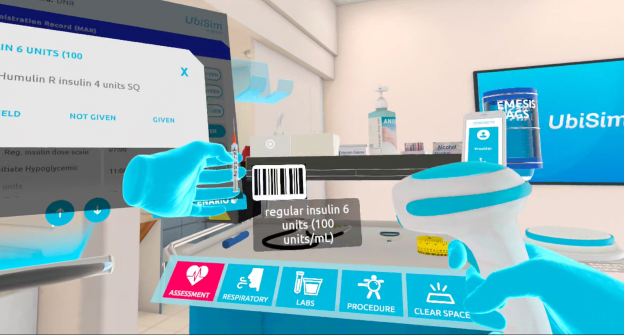Training Nurses to Care for Patients with Mpox in Virtual Reality

Table of Contents
Name of the heading 1
1- Start your table with the syntax {start-table}
2 - Add an H3 Heading to create a new column (this will be the column title)
3 - List cells as bullet points in a List element
4 - End your table with the syntax {end-table}
Nurses are at the front lines of care, and mpox, previously known as monkeypox, is becoming an increasingly more concerning disease due to its potential for human-to-human transmission and its resemblance to chickenpox and smallpox. According to researchers, “Enhancing nursing care for mpox patients is imperative to manage and contain its spread effectively” (Dubey, T. et al.).
While a nursing assessment and infection control measures are crucial, psychosocial support is equally as important, as patients often experience fear and anxiety due to how contagious mpox is. Research has shown that the disease primarily shows up in males who are gay or bisexual, so there is an added layer of stigma that nurses must learn to navigate with compassion and care (März, J. et. al.).
As of August 14, 2024, the World Health Organization Director-General declared the mpox outbreak a public health emergency of international concern. It’s imperative that nurses are properly trained, especially as simulating the specific challenges of mpox care can be difficult.
Using virtual reality (VR) is one helpful way to train nurses on how to care for these patients.
Using Virtual Reality to Care for Patients with Mpox
Therapeutic communication is a huge benefit of VR. In UbiSim, a VR training platform created by nurses for nurses, participants practice caring for a patient experiencing mpox stigma. Learners employ their therapeutic communication skills and empathy to support the patient's emotional and mental well-being.

Here are the learning objectives they’ll walk through:
- Conduct a focused nursing assessment for a patient presenting with mpox
- Prioritize and implement interventions for the care and treatment of mpox
- Implement appropriate infection control measures while caring for a patient with mpox
- Demonstrate effective therapeutic communication techniques and provide support to address any patient concerns related to stigma
- Provide community health and patient-centered education to promote care of self and others during an infectious disease period
Cultural Sensitivity and Humility
In the context of mpox, where certain populations face stigma or discrimination, it’s crucial for nurses to approach patient care with a deep understanding of cultural differences and individual experiences. VR simulations can immerse nurses in scenarios that require them to interact with patients from diverse backgrounds, helping them to consider factors such as language barriers, cultural beliefs, and social stigmas.
By engaging in these VR scenarios, nurses can practice and refine their ability to communicate with humility and sensitivity, ensuring that they provide personalized care that honors each patient’s unique identity.
Psychologically Safe Space to Make Mistakes
A student using UbiSim’s immersive platform shared, “Being in VR created a safe ‘bubble’ where I’m not worried about sounding dumb or making mistakes.” Students are able to practice those communication skills in a safe setting.
Holldrid Odreman, Ph.D. at Niagara College, did research that backed psychological safety in VR and how that safety led to better clinical judgment: “There was a significant positive correlation between participants feeling psychologically safe and their ability to make clinical judgments during a simulated skills scenario. This suggests that as participants’ feelings of psychological safety during their pre-briefing experience increase, their abilities to carry out clinical reasoning and judgment tend to increase.”
With the presence of stigma, it can be challenging to navigate the complexities of communication. In this safe environment, students are free to practice therapeutic communication so they get it right in clinical settings.
Final Thoughts
Mpox is a growing concern, and nurses play a critical role in caring for, educating, and communicating with patients who have this disease. Virtual reality is one of many tools higher education institutions and hospitals can use to train their nurses to be better prepared. VR also prepares nurses not just for mpox but for future pandemics or emerging infectious diseases.
FAQs
Heading 1
Heading 2
Heading 3
Heading 4
Heading 5
Heading 6
Lorem ipsum dolor sit amet, consectetur adipiscing elit, sed do eiusmod tempor incididunt ut labore et dolore magna aliqua. Ut enim ad minim veniam, quis nostrud exercitation ullamco laboris nisi ut aliquip ex ea commodo consequat. Duis aute irure dolor in reprehenderit in voluptate velit esse cillum dolore eu fugiat nulla pariatur.
Block quote
Ordered list
- Item 1
- Item 2
- Item 3
Unordered list
- Item A
- Item B
- Item C
Bold text
Emphasis
Superscript
Subscript
Explore more

Mitigating Medication Administration Errors: VR Training for New Nurse Transition
Discover how VR simulation builds competency, reduces transition shock, and cuts turnover in nurse residency programs.

Why Academic-Practice Partnerships are the Future of Nursing
Learn how VR-enhanced Academic-Practice Partnerships eliminate transition shock, achieve 100% retention, and save health systems millions in turnover costs.

Beyond Pass Rates: Why Clinical Judgment Is the Measure of Nursing Readiness
Discover why clinical judgment, not just pass rates, indicates nursing workforce readiness. Learn how AI-enhanced VR simulation builds practice-ready graduates.


